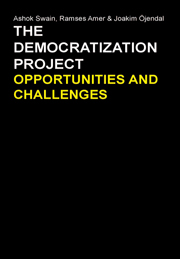Book contents
- Frontmatter
- Contents
- List of Tables
- List of Figures
- Acknowledgements
- Contributors
- The Democratization Project: Opportunities and Challenges
- 1 The Democratization Project: Peace, Conflict and Development
- 2 Non-Authorized Military Interventions and Legitimization by the United Nations
- 3 From Condemnation to Legitimization of Outcome: The United Nations and the Use of Force in Inter-State Relations
- 4 Demos or Deus: Patterns of Religious Dimensions in Asian Armed Conflicts, 1945–2005
- 5 The Left and Democratic Consolidation – Deepening Democracy in Latin America?
- 6 Democracy without People? – The Risk of Monopolizing the Democratization Project
- 7 The Role of Hamas in Building Palestinian Democracy in the Midst of Violence
- 8 Elections and Violence in Sri Lanka: Understanding Variation Across Three Parliamentary Elections
- 9 Post-Accord Elections and Armed Conflict
- 10 Peace Through Democracy? The Challenges of Postwar Democratization in Weak and War-Torn States
5 - The Left and Democratic Consolidation – Deepening Democracy in Latin America?
Published online by Cambridge University Press: 05 March 2012
- Frontmatter
- Contents
- List of Tables
- List of Figures
- Acknowledgements
- Contributors
- The Democratization Project: Opportunities and Challenges
- 1 The Democratization Project: Peace, Conflict and Development
- 2 Non-Authorized Military Interventions and Legitimization by the United Nations
- 3 From Condemnation to Legitimization of Outcome: The United Nations and the Use of Force in Inter-State Relations
- 4 Demos or Deus: Patterns of Religious Dimensions in Asian Armed Conflicts, 1945–2005
- 5 The Left and Democratic Consolidation – Deepening Democracy in Latin America?
- 6 Democracy without People? – The Risk of Monopolizing the Democratization Project
- 7 The Role of Hamas in Building Palestinian Democracy in the Midst of Violence
- 8 Elections and Violence in Sri Lanka: Understanding Variation Across Three Parliamentary Elections
- 9 Post-Accord Elections and Armed Conflict
- 10 Peace Through Democracy? The Challenges of Postwar Democratization in Weak and War-Torn States
Summary
Introduction
During the third wave of democratization in the 1980s and 1990s, most of the countries in Latin America made transitions from military dictatorship to electoral democracies. Most of the newly elected governments were right wing–neoconservatives or neoliberals–and chose to develop or maintain elite democracy and the hegemony of neoliberal economic policies, and were less concerned with social reforms. The business elite and the dominant domestic and international actors, with a few exceptions, accepted the outcome of electoral democracy, mainly because the threat of the radical left had vanished, because of poor economic performances, and because the economic elite had been excluded from politics during the military dictatorships. Further, it would decrease the demand of people's expectation of deepening democracy and carrying out social reforms, and it would give economic prosperity and a peaceful future.
However, this global development of democracy and neoliberalism has some paradoxes in Latin America. On one hand, democracy has enlarged the right to vote to all adults in free and fair elections, including groups that were excluded from politics during military rule, such as radical leftist parties. On the other hand, democratically elected governments do not function in the same way as “normal” democratic governments are supposed to function. In the Latinobarómetro poll (2002), more than sixty percent of the people were discontented because of the failure of the governments, political leaders, political parties and the political institutions' ability to provide needs such as jobs, education and security.
- Type
- Chapter
- Information
- The Democratization ProjectOpportunities and Challenges, pp. 87 - 104Publisher: Anthem PressPrint publication year: 2009

